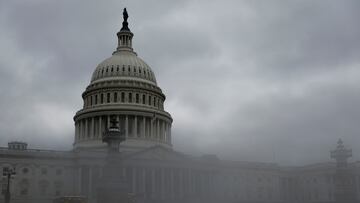Debt ceiling deal: What’s next after reaching an agreement?
Like any bill that passes through Congress, the debt ceiling legislation will need to be passed by the House and the Senate before reaching the President.


Negotiations for the debt ceiling concluded over the weekend, potentially staving off a debt default and government shutdown. Measures include: keeping non-defence government spending flat, temporarily expand work requirements for certain adults receiving food stamps, and cut IRS funding amongst other agreements.
It “represents a compromise, which means not everyone gets what they want,” conceded President Biden.
Reporter: "Mr. President, you said at the beginning, the debt ceiling was non-negotiable, but isn't that what you've just done here?" pic.twitter.com/VhXJn7JHaR
— The Recount (@therecount) May 28, 2023
The bill is the “most conservative deal we’ve ever had.” House speaker Kevin McCarthy told reporters.
Politicians had three days since Sunday to digest the 99-page document, debate it, and pass it.
The bill’s path through Congress
The agreement reached by lawmakers needs to be approved by both houses of Congress, needing a majority vote to get over the line. Wednesday is the first day legislators can vote on the proposals.
The House Rules Committee will hold a hearing at 3 p.m. on Tuesday which will decide the the rules and length of voting time, while senators “should prepare for potential Friday and weekend votes,” according to Senate Majority Leader Chuck Schumer.
Once the bill passes both the House and the Senate, it is sent to the President for approval. Joe Biden will sign the bill into law without any qualms after he played a key role in negotiating it.
Once the bill becomes law, the Treasury Department and other relevant government agencies will implement the new debt ceiling and make necessary adjustments according to the plan.
What is the likelihood of it passing quickly?
Considering it has been thrashed out by two of the most senior politicians from both parties there should be broad bipartisan agreement to get the bill passed. Expect many votes against it from progressive Democrats and right-wing Republicans.
“It has historic reductions in spending, consequential reforms that will lift people out of poverty into the workforce, rein in government overreach - there are no new taxes, no new government programs,” boasted McCarthy.
Related stories
But not everyone in his party is pleased.
House Freedom Caucus member Rep. Ken Buck (R-CO) predicts the debt ceiling agreement will “be on the level of Obamacare” for GOP voters. pic.twitter.com/9gGw0ZY8Rw
— The Recount (@therecount) May 30, 2023
Politicans have until 5 June to pass the bill or the US risks defaulting on its debt, which would be disastrous for the world economy.

